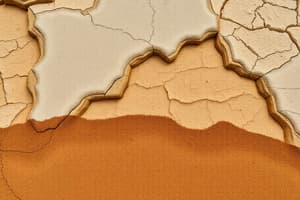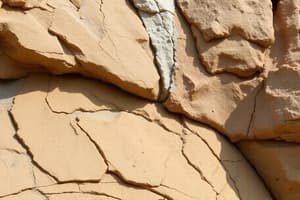Podcast
Questions and Answers
How is weathering different from erosion?
How is weathering different from erosion?
Weathering is the breaking of rocks into smaller pieces called sediments; erosion is the movement of these sediments to a new location.
How is mechanical weathering different from chemical weathering?
How is mechanical weathering different from chemical weathering?
Mechanical weathering physically breaks rocks into smaller pieces; chemical weathering changes the surface of rocks into new substances.
How does water mechanically weather rocks?
How does water mechanically weather rocks?
Water in streams and rivers carries sediments that cause abrasion; water flows into cracks in rocks where it can freeze and cause ice wedging.
How does abrasion change the shape of rocks?
How does abrasion change the shape of rocks?
Why is water considered the 'most important' cause of weathering?
Why is water considered the 'most important' cause of weathering?
What causes acid rain?
What causes acid rain?
How does mechanical weathering make it easier for a rock to be chemically weathered?
How does mechanical weathering make it easier for a rock to be chemically weathered?
How does chemical weathering make it easier for a rock to be mechanically weathered?
How does chemical weathering make it easier for a rock to be mechanically weathered?
Why is there more mechanical and chemical weathering in wet climates?
Why is there more mechanical and chemical weathering in wet climates?
Why is there less chemical weathering in dry climates?
Why is there less chemical weathering in dry climates?
Why is there more chemical weathering in warm and wet climates?
Why is there more chemical weathering in warm and wet climates?
Why is there more mechanical weathering in cool and wet climates?
Why is there more mechanical weathering in cool and wet climates?
How are young mountains different from old mountains?
How are young mountains different from old mountains?
Flashcards are hidden until you start studying
Study Notes
Weathering vs. Erosion
- Weathering breaks rocks into smaller pieces known as sediments, while erosion involves the movement of these sediments to new locations by natural forces like water, ice, wind, or gravity.
Types of Weathering
- Mechanical weathering involves physically breaking rocks into smaller fragments without changing their composition.
- Chemical weathering alters the chemical structure of rocks, transforming them into new substances, such as rust.
Water's Role in Mechanical Weathering
- Water causes mechanical weathering through abrasion, where sediments carried by moving water wear down rock surfaces.
- Ice wedging occurs when water seeps into rock cracks, freezes, and expands, leading to further rock fragmentation.
Effects of Abrasion
- Continued abrasion alters the shape of rocks, smoothing sharp edges and creating rounder forms.
Importance of Water in Weathering
- Water is vital for weathering processes, enabling both mechanical actions like abrasion and chemical reactions vital for weathering.
Causes of Acid Rain
- Acid rain results from pollutants such as sulfur released into the atmosphere during the burning of fossil fuels, impacting environmental health.
Interplay Between Mechanical and Chemical Weathering
- Mechanical weathering facilitates chemical weathering by increasing the surface area of rocks, making them more prone to chemical reactions.
- Conversely, chemical weathering can soften rocks, making them easier to break down through mechanical actions.
Climate Influences on Weathering
- Wet climates promote both mechanical and chemical weathering due to abundant rainfall that supports reactions and physical processes like ice wedging.
- Dry climates, such as deserts, experience minimal chemical weathering due to insufficient water for necessary reactions.
Temperature Effects on Weathering
- Warm and wet environments, typically found in tropical regions, accelerate chemical weathering due to enhanced reaction rates under higher temperatures.
- Cool and wet locales, such as temperate regions, increase mechanical weathering, particularly through processes like ice wedging.
Mountain Age Comparison
- Young mountains are characterized by steep, rocky terrain with sharp peaks and high elevations, indicating less weathering.
- Old mountains exhibit gentler slopes, smoother tops, and are covered in soil and vegetation, showing significant weathering over time.
Studying That Suits You
Use AI to generate personalized quizzes and flashcards to suit your learning preferences.




